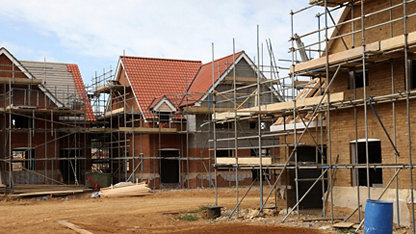Overview
- Action is needed from industry and government to ensure the continued success of the construction sector, delivering sustainable, high quality, high value infrastructure fit for the future.
- RICS is a major advocate of putting economic, social and environmental sustainability at the heart of the sector and is delivering a number of work streams actioning change on the ground.
- The Government must also commit to a long-term vision for the future of construction, taking action to mitigate economic headwinds, and driving decarbonisation, productivity, and value.
Introduction
Construction is critical to the success of the UK economy, employing 9% of the entire UK workforce and contributing 7% of UK GDP. And while the sector provided a rare and essential success story throughout the pandemic and shows continued growth, headwinds are growing.
To manage those headwinds will require coordinated work across industry and government: improving productivity, driving decarbonisation, future-proofing skills, and enabling greater collaboration and conflict avoidance.
RICS is at the forefront of realising this future-proofed construction sector, with economic, social and environmental sustainability at its heart. Delivering on this agenda will ensure the sector’s continued contribution to the UK’s economic and social goals, and recognition of the sector as a key source of competitive advantage internationally.
The below article sets out an overview of ongoing RICS work streams, as well as detailing our calls to action for governments across the UK.
What is RICS doing?
Decarbonisation: RICS standards, and the expertise of industry professionals, will enable carbon measurement and reporting at the earliest stages, allowing decision makers to compare the costs and carbon of different projects, across sectors and internationally. This includes the option of making use of existing assets. RICS is also assessing its entry qualifications to put sustainability at the heart of the profession. Standards and work streams include:
- While Life Carbon Assessment: How to measure carbon across the lifecycle of built environment projects.
- International Cost Management Standard – 3rd Edition: Reporting the carbon and cost implications of projects, and helping to benchmark against comparable initiatives.
- Built Environment Carbon Database: An evolving source of carbon data in the built environment, with cross-industry support.
- Discussions with Government: Working with governments to embed best practice in the measurement of carbon, and shape both regulations and procurement practice.
- UK Net Zero Carbon Buildings Standard: Working with the UK Green Building Council and other organisations to develop a new Zero Carbon Standard.
Procurement and collaboration: Three core interconnected themes must be addressed: Value and quality, accountability and conflict avoidance.
- Value and quality: RICS has taken a leading role in developing the Value Toolkit, advocating a shift towards value over price, and a move away from unsustainable costing.
- Accountability: RICS supports the move away from retentions, provided there is some alternative form of assurance, accountability and protection for all parties working on construction projects. The status quo presumption should be that retentions should not be used unless requested, and we are working with the Construction Leadership Council on a Defects League Table pilot.
- Conflict avoidance: Improved collaboration is also essential, as is the need to drive conflict avoidance and utilise alternative forms of dispute resolution. RICS, alongside industry partners, promotes the adoption of the Conflict Avoidance Process (CAP) to recognise such ambitions and ensure a culture of collaboration survives throughout a project’s lifecycle.
More broadly, RICS recommends adherence to the Black Book, Professional Guidance on Retention, and Professional Guidance on Tendering Strategies to drive up standards.
Productivity: While construction is a key driver of value and economic growth, the sector is less efficient than it should be. Thought should be given to the structure of industry, including fragmentation and resulting inefficiencies. RICS is working to build understanding and skills for the use of novel technologies, particularly with digitalisation and the use of data. To support industry, RICS is producing significant thought leadership and guidance in this area, with guidance on digital twins, industrialised construction, and modern methods of construction. Such developments hold the potential to transform the sector.
In addition to those work streams above, RICS will be publishing two critical pieces of thought leadership over the coming months, including:
- Construction and Infrastructure Impact Report, looking at the contribution of the sector to the economy and opportunities for the future.
- Decarbonisation of the Built Environment, taking a holistic view of what needs to be done to enable a transition to net zero.
Published date: 20 November 2017
Published date: 16 March 2012
Published date: 30 June 2014
Published date: 22 May 2020
Published date: 17 September 2018
What must government do?
- Commit to continued investment in upgrading the UK’s infrastructure and provide a long-term vision for the future pipeline of activity, allowing the sector and supply chains to plan accordingly and address potential barriers.
- Act quickly to mitigate the triple threat of rising costs, materials shortages, and labour supply, by reassessing visa requirements and ensuring efficient transit of materials.
- Lead by example in procuring for value over price, prioritising quality and the lifecycle. management of cost and carbon. This should incorporate novel best practice standards, including the Value Toolkit and ICMS3.
- Play an active role in encouraging inter-disciplinary training and adopt a procurement method that encourages vertical integration and greater efficiencies, in order to drive up productivity in the sector.
- Commit to fostering a culture of collaboration and conflict avoidance between the private and public sector, and across the supply chain, including implementation of the Conflict Avoidance Process (CAP).
“Construction has been a crucial UK success story over recent years but its potential to be a key source of continued growth and competitive advantage internationally is at risk. To realise this potential, further action is needed from Government and industry to commit to a long-term future pipeline of activity and ensure best practice throughout the supply chain, including greater collaboration, productivity, and use of sustainable and innovative technologies. We look forward to working together to ensure the sector’s continued success amid challenging economic conditions and to enable a transition to net zero.”
Vincent Clancy
CEO, Tuner & Townsend
Recent publications
- RICS UK Construction & Infrastructure Monitor Q2 2022: Workload expectations still positive but concerns grow about economic and industry challenges.
- RICS UK Construction & Infrastructure Monitor Q1 2022: Lack of materials impeding UK construction activity.
Contact
For more information or to get involved in RICS’ policy work, contact Senior Public Affairs Officer, Euan Ryan, at eryan@rics.org.













